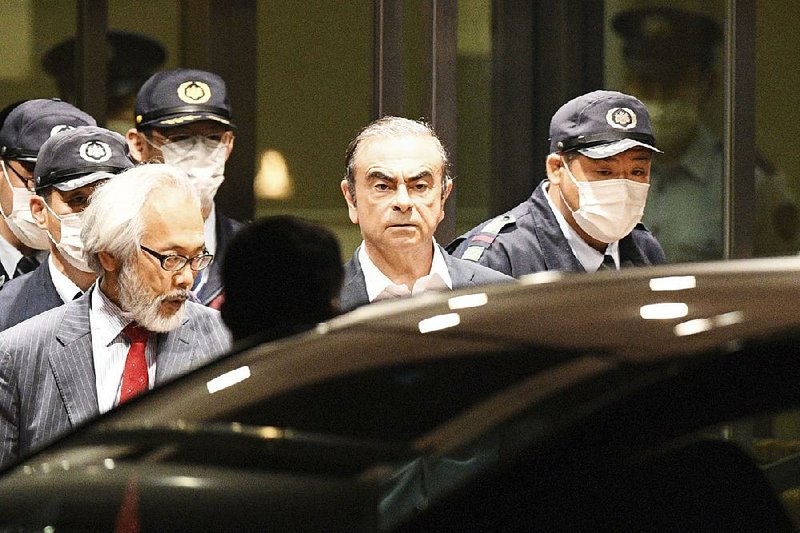Former Nissan Chairman Carlos Ghosn walked out of a Tokyo detention center after winning release on bail for the second time, giving the ousted auto titan a chance to prepare his defense against charges of funneling millions of dollars from Nissan Motor Co. through an intermediary for his own purposes.
A court set Ghosn's bail at $4.5 million on Thursday. The conditions of his release are largely the same as before: He must live in his Tokyo apartment, he cannot travel abroad, he is not allowed to have contact with people related to the investigation and he must adhere to requirements meant to prevent the destruction of evidence.
However, there is one major difference: Ghosn will not be allowed to meet with his wife, Carole, without first applying for permission from the court, Japanese news reports said.
Ghosn was freed late in the evening after prosecutors' last-ditch appeal of his release was rejected by the Tokyo district court. Dressed in a dark suit, white shirt and no tie, he left the facility with one of his lawyers, Takashi Takano, around 10:20 p.m. local time. They stepped into a black Toyota van and drove off.
In a statement issued after his release, Ghosn reasserted his innocence and said he'll "vigorously" defend himself. He also criticized his treatment by Japanese authorities and the conditions placed on his wife.
"No person should ever be indefinitely held in solitary confinement for the purpose of being forced into making a confession," Ghosn said. "But restricting communications and contact between my wife and me is cruel and unnecessary. We love each other very much, she answered all of the prosecutors' questions in court, and she has done nothing wrong."
Ghosn's family has said it believes the repeated arrests are a tactic by prosecutors to try to coerce a confession. Japanese courts have a conviction rate close to 100% and defendants in the majority of cases confess to their crimes, sometimes under duress from prosecutors.
Unlike the last time he was released, Ghosn wore no disguise. The first time he left jail, his lawyers disguised the former auto executive as a construction worker, which briefly became a sensational story of its own. Ghosn was detained for a second time on April 4, cutting short almost a month of freedom after previously paying $9 million in bail. Authorities said they detained him again because they believed he might destroy evidence in a case stretching back to his first arrest in November. Ghosn has proclaimed his innocence on all charges.
Including the latest three-week stint, this means Ghosn has been detained for about 130 days since his arrest in November just after the private jet he was on landed at Tokyo's Haneda airport.
"The only justification for keeping him in detention are that he will flee or destroy evidence," Stephen Givens, a professor of law at Sophia University in Tokyo, said before Ghosn's latest bail decision. "After the first two indictments, he was able to put together a set of conditions that told the court he wasn't likely to flee."
The latest indictment against Ghosn was filed Monday. Using foreign corporate entities in 2017 and 2018, Nissan lost $5 million that was funneled into accounts controlled by Ghosn, prosecutors said. Those constitute the most serious allegations yet against the former chairman, who once led the global alliance between Nissan, Renault SA and Mitsubishi Motors Corp.
The release will allow Ghosn to return home and work with his lawyers for his upcoming trial, which may start later this year or next year. Ghosn rebutted the latest charges, saying prosecutors were "aided and abetted by certain Nissan conspirators."
Nissan reissued the same statement it made during previous developments in the Ghosn case, saying it cannot comment on judicial decisions or processes but that its own investigation found "substantial evidence of blatantly unethical conduct" by Ghosn and former right-hand-man Greg Kelly, who remains free on bail after being arrested along with Ghosn in November.
After Ghosn's first arrest, Nissan and Renault uncovered payments made through companies in Oman and Lebanon that allegedly were used for Ghosn's personal benefit, including a yacht and his son's startup. One company, Beirut-based Good Faith Investments, made money transfers to a firm connected to Anthony Ghosn, people familiar with the matter said.
Ghosn's first arrest shook the auto alliance to its core. Since then, the three companies adopted a new governance structure designed for smoother and more equitable decision-making.
Information for this article was contributed by Kae Inoue and Lisa Du of Bloomberg News and by Ben Dooley of The New York Times.
Business on 04/26/2019
